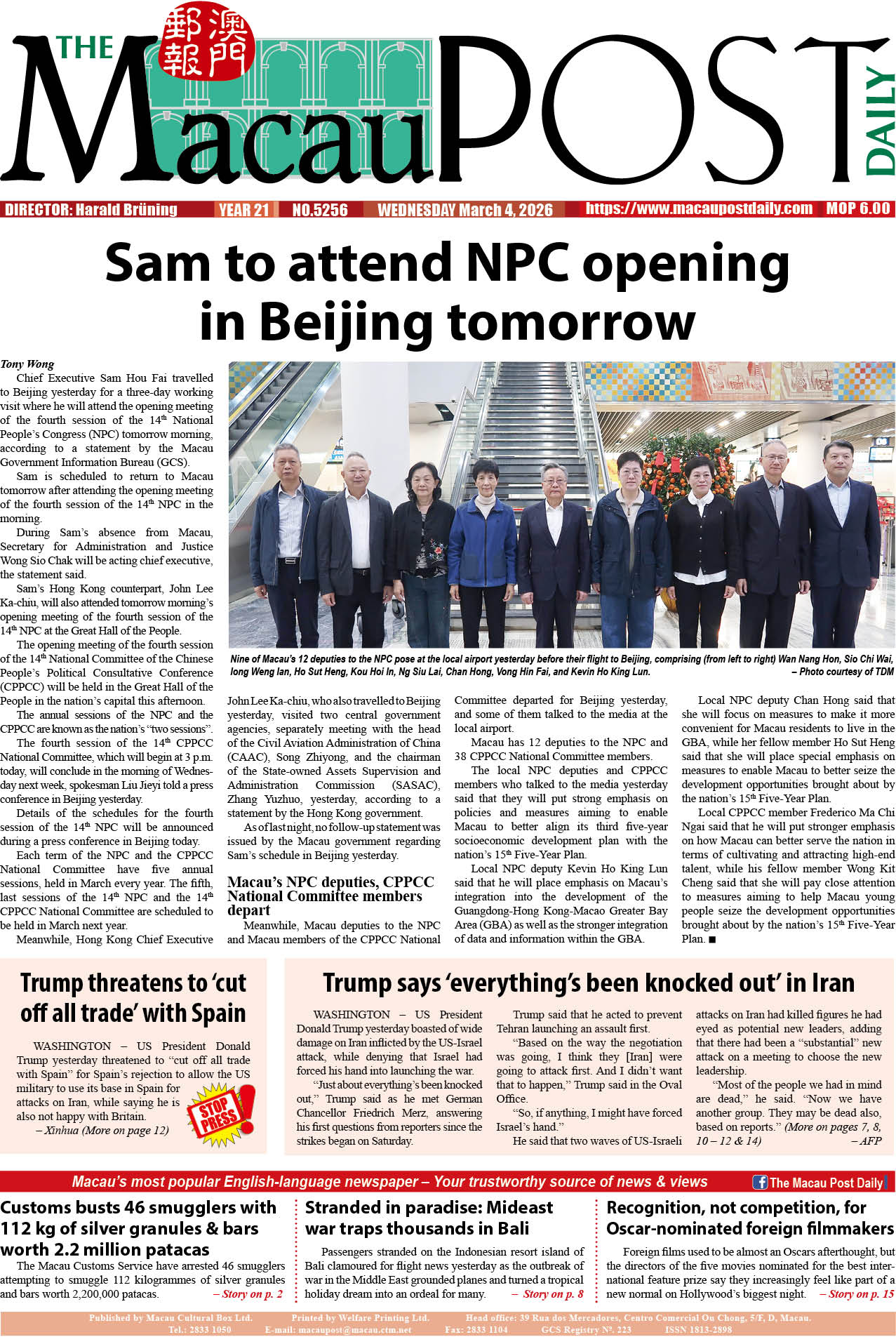The government launches a one-month public consultation today on the drafting of its youth policy to be implemented from next year to 2030, according to which those aged between 13 and 35 will be covered by its new youth policy, a change from the current youth policy’s age range from 13 to 29.
The Macau Youth Policy 2021-2030 will place more emphasis on patriotism, compared to the current Macau Youth Policy 2012-2020, officials said yesterday.
A press conference about the public consultation was held yesterday at the Education and Youth Affairs Bureau (DSEJ). The public consultation will end on December 11. Five public sessions will be held during the consultation period – each for the general public, pupils and students, school teaching staff, youth associations, and associations from other segments of civil society respectively.
The public consultation document points out that the current youth policy will end this year, and therefore the bureau has decided to submit its draft youth policy for the next decade to a public consultation process after listening to opinions from the government-appointed Youth Affairs Committee and various youth associations in the city.
According to the document, the bureau commissioned Sun Yat-sen University in Guangzhou in 2016 to carry out a mid-term review and evaluation of the Macau Youth Policy 2012-2020. The Macau University of Science and Technology (MUST) was commissioned last year to carry out an evaluation of the youth policy’s effectiveness. The findings of the two evaluations showed that the areas covered by the Macau Youth Policy 2012-2020 are consistent with the youth policy directions in various countries and regions, the document says.
The bureau has concluded that the various action plans laid out by the current youth policy have achieved good results, the document says.
The document underlines that the new youth policy for the next decade will have to be formulated in a way that will meet young local people’s needs “in the new era” and help them get involved in the nation’s development plans, Belt and Road Initiative (BRI), and Outline Development Plan for the Guangdong-Hong Kong-Macau Greater Bay Area (GBA), as well as Macau’s development into a world tourism and leisure centre, a commercial and trade cooperation service platform between China and Portuguese-speaking countries (PSCs), and a cultural exchange and cooperation base with Chinese culture as its mainstream and the coexistence of different cultures.
According to the document, the government proposes that it will formulate the Macau Youth Policy 2021-2030 complete with further improvements to the current youth policies that have achieved good results, apart from various new contents.
Addressing yesterday’s press conference, DSEJ Deputy Director Kong Chi Meng said that his bureau proposes to raise the age coverage up to 35 years for the new youth policy after considering a number of factors, namely the city’s increased average life expectancy, young people’s increased duration of education, and the government’s aim for its youth policy to meet the needs of more young residents. Kong pointed out that the new proposed age range from 13 to 35 will be in line with the mainland’s overall youth policy and those of other GBA cities.
The GBA comprise the nation’s two special administrative regions of Hong Kong and Macau and nine cities of Guangdong province.
4 kinds of youth
According to Kong, the government proposes that young local residents will be divided into four categories under the Macau Youth Policy 2021-2030, namely 1) studying youth (pupils and higher education institution students), 2) working youth: those who are employed or self-employed, 3) working and studying youth: those who are working and studying at the same time, and 4) non-studying and non-working youth: those who are neither studying nor working.
The current Macau Youth Policy 2012-2020 only divides young residents into three categories, without the category of working and studying youth.
The public consultation document points out that Macau’s population aged between 13 and 35 stood at 219,900 at the end of last year, accounting for 32.36 of the total population.
5 objectives, 10 measures
The draft Macau Youth Policy 2021-2030 lays out five policy directions and objectives, namely 1) promoting the spirit of loving the country and loving Macau, enhancing the devotion to the motherland, 2) improving morality, enhancing physical and mental qualities, 3) enhancing comprehensive ability, promoting all-round development, 4) jointly creating a harmonious atmosphere, building an inclusive society, and 5) promoting social participation and integration into national development.
With the aim of achieving the five policy directions and objectives, the government proposes 10 major measures, namely 1) strengthening patriotic education, enhancing devotion to the motherland, 2) strengthening moral education, advocating a healthy lifestyle, 3) improving comprehensive qualities, enhancing core competence, 4) strengthening talent cultivation, promoting diversified development, 5) strengthening outbound exchanges, expanding space for development, 6) strengthening two-way communication, creating a positive atmosphere, 7) promoting social inclusion, ensuring equal opportunities, 8) supporting youth in setting up associations, making use of associations’ clout , 9) fostering a sense of participation, showing concern for social development, and 10) ensuring resource allocation, integrating various resources.
The current Macau Youth Policy 2012-2020, the full version of which is available on the bureau’s website, only mentions a few sentences concerning patriotism.
However, Kong said the government would not adopt a “hard sell” approach towards patriotic education.
Kong said that the 10 proposed measures for next decade’s youth policy aim to promote youth development, help young local residents integrate themselves into regional cooperation and the national development, and foster their sense of responsibility.
Kong also said that the government plans to roll out about 400 new action plans for its new youth policy, adding that some of the action plans in the current youth policy would be kept intact for next decade’s youth policy.
Parenting education
In addition to strengthened patriotic education, one of the major differences between the current youth policy and the new one is that the government aims to strengthen its work on parenting education for young local residents, as many of those aged between 30 and 35 already have children, Kong said, adding that the government will convert the current Taipa Educational Activities Centre at Nova Taipa Garden into the city’s Parental Education Centre after the merger between his bureau and the Higher Education Bureau (DSES) in February next year.
Education and Youth Affairs Bureau (DSEJ) Deputy Director Kong Chi Meng (centre) addresses yesterday’s press conference about the government proposed Macau Youth Policy 2021-2030, as Cheong Man Fai (left), who heads the bureau’s Youth Department, and Io Iok Fong, a senior public servant of the department, look on. Photo: Tony Wong







